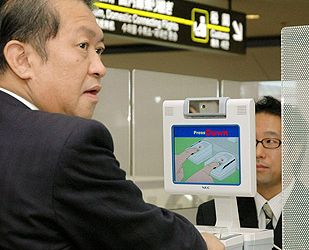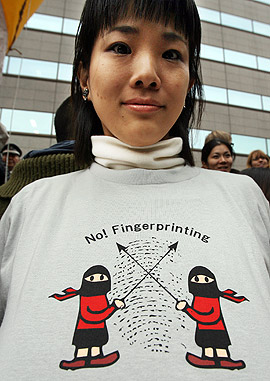Japan imposes new security policy
Authorities begin biometric checks at airports, amid criticism of rights violations.

“At a time when terrorism is occurring throughout the world, we want foreigners entering Japan to co-operate, and to understand that it is better for them as well that Japan be safe,” he said.
“The biggest objective is to prevent terrorism.”
Security checks
Visitors arriving at Narita will have both their index fingers electronically scanned and have a digital photograph taken of their face.
The information will be checked against terrorist watch lists and files on foreigners with criminal records in Japan, and those matching the data or refusing to co-operate will be denied entry and deported.
Officials said the bureau will store the data for “a long time” but did not say how long.
Toshihiro Higaki, an immigration official at Narita, said the checks were meant as a deterrent.
“There are people who change their names, use wrongly obtained passports, and pretend to be other people,” he said.
Criticism
 |
| Rights groups, business councils and resident foreigners are opposed to the new policy [AFP] |
But critics say the policy reflected the deeply-entrenched view in Japan that foreigners were more likely to commit crimes while playing down the possibility of Japanese groups being involved in attacks.
Mitsuru Namba, a lawyer at the Japan Federation of Lawyers Associations, said fingerprinting was reserved for crime suspects and treating foreigners the same way was “a serious human rights violation”.
“The government says the aim is to prevent terrorism, but in the background is discrimination linking foreigners with crime and overstaying visas,” said Namba.
The move has also sparked complaints from business travellers and resident foreigners.
In a letter to the justice ministry, the European Business Council, and the Australian and New Zealand Chamber of Commerce in Japan, said the new measures “risks creating excessive delays for frequent business travellers and imposing unacceptable costs on businesses”.
Also on Tuesday dozens of people gathered outside the justice ministry to protest the measure.
Rebecca Miller, an Australian student living in Japan since July, said she did not like the government “having personal information of mine”.
“I don’t think they got any rights on my bodily information,” she added.
A day earlier about 70 civic groups from around the world delivered a protest letter to the justice minister.
“We believe that your plans … are a gross and disproportionate infringement upon civil liberties, copying the most ineffective, costly and risky practices on border management from around the world,” the letter said.
Concern over attacks on Japanese soil increased in 2004, after repeated security breaches involving a French national, Lionel Dumont, with suspected links to al-Qaeda and a history of violent crime.